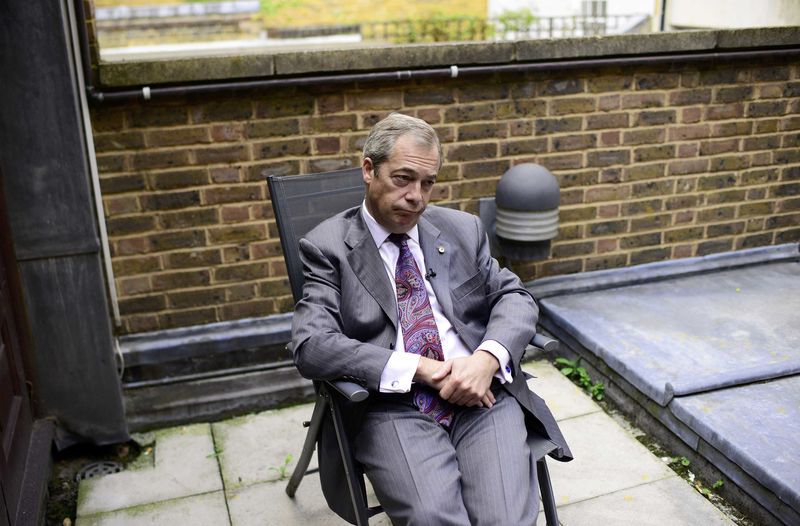By William James
LONDON (Reuters) - Brexit will inspire support for Donald Trump and smooth his path to victory in the U.S. presidential election in November, according to Nigel Farage, an architect of the political uprising that saw Britons vote to leave the European Union.
As Britain and the rest of the EU come to terms with the political and economic shock of the Leave vote, the United States is heading into an election with polls showing Trump, the populist Republican candidate, mounting a strong challenge for leadership of the world's largest economy.
Farage helped harness British voters' dissatisfaction with EU membership and turn it into a political force capable of defeating the pro-Remain government in the June 23 referendum. He has since turned his attention to U.S. politics, speaking on stage with Trump at a rally in Mississippi last month.
Having tested the waters in the United States, he believes the same anti-establishment forces behind Brexit will propel Trump to victory in the Nov. 8 election.
"I now strongly think Trump will win," he told Reuters in an interview at his London office.
"I think Brexit is the first kickback against the establishment. It's not a British event, it's not a European event. It's a global event and I think it has implications for every Western democracy. In the case of America - absolutely."
Trump, a wealthy property developer, reality TV star and provocative political outsider who stunned even his own party by winning the right to battle veteran Democrat Hillary Clinton for the presidency, has come from a no-hoper to within a few percentage points of his mainstream rival.
Farage is a member of the European Parliament and has stood for election in Britain several times. But his straight-talking views and love of a cigarette and a beer at the pub have helped him become one of Britain's most distinctive politicians.
"There are people in America who look at Washington, who look at the lobby and the power of big business, who look at the detachment of a political class from them and their lives in a very similar way to how many of us saw Brussels," Farage said, referring to the EU's seat of power in Belgium.
Farage stood down as leader of the anti-EU UK Independence Party after the Brexit vote, saying he wanted to get his personal life back, but the lure of getting involved in another insurgent political campaign has proved strong.
He explained with a grin the series of events that saw an invitation to speak at a private Trump political dinner escalate into the magnate introducing him on stage at a large rally in Mississippi as "the man behind Brexit".
"It seemed to go down quite well. The next day Hillary Clinton was attacking me on a personal basis, so I thought 'Well, I must've got somewhere'," he said.
BIGGER THAN BREXIT
Critics say both Trump and Farage have massaged fears over immigration for political advantage.
Farage appeared in front of a controversial poster during the Brexit campaign showing lines of migrants under the slogan "Breaking Point" - although the photograph was taken in distant southeastern Europe, while Trump has pledged to build an anti-immigrant wall along the U.S.-Mexico border.
Farage said he and Trump shared a common touch that allows them to connect with voters alienated from traditional politics.
"He's not afraid to speak his mind, and yeah, I know that absolutely gets the liberal establishment screaming blue murder, but maybe that's the way politics is going in the west."
However, Farage voiced concern about Trump's stated policies on NATO and free trade.
"The big question is NATO," he said, citing Trump's doubts over whether to protect NATO allies from Russia unless they cover more of U.S. defence costs. "I would very much hope that Trump, if he saw everyone else pulling their weight, would get a bit more behind NATO than he's been."
He also said a Trump victory could see the United States "turn a little bit against" his view that free trade and free movement of capital benefits, rather than harms, society.
Farage said he would return to the United States to watch the second and third presidential debates in anticipation of witnessing another victory for the political underdog.

"It would be Brexit on a bigger scale," he said. "It would be the outsider who comes into politics, that is loathed and condemned by the professional media and political elite but proved to be a winner."